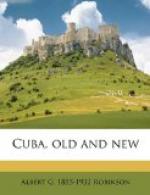Shortly before the final dispersion of the Army of the Revolution, there was organized a body with the imposing title of La Asamblea de Representantes del Ejercito Cubano, or the Assembly of Representatives of the Cuban Army. It was composed of leaders of the different military divisions of that army, and included, as I recall it, thirty-one members. This group made no little trouble in the early days of the American occupation. It gathered in Havana, held meetings, declared itself the duly chosen and representative agent of the Cuban people, and demanded recognition as such by the American authorities. Some of its members even asserted that it constituted a de facto government, and held that the Americans should turn the whole affair over to them and promptly sail away. But their recognition was flatly refused by the authorities. At the time, I supported the authorities in this refusal, but afterward I felt less sure of the wisdom of the course. As a recognized body, it might have been useful; rejected, it made no little trouble. Transfer of control to its hands was quite out of the question, but recognition and co-operation might have proved helpful. That the body had a considerable representative quality, there is no doubt. Later, I found many of its members as members of the Constitutional Convention, and, still later, many of them have served in high official positions, as governors of provinces, members of Congress, in cabinet and in diplomatic positions. I am inclined to regard the group broadly, as the origin of the present much divided Liberal party that has, from the beginning of definite party organization, included a considerable numerical majority of the Cuban voters. In the first national election, held December 31, 1901, this group, the military group, appeared as the National party, supporting Tomas Estrada y Palma as its candidate. Its opponent was called the Republican party. Realizing its overwhelming




